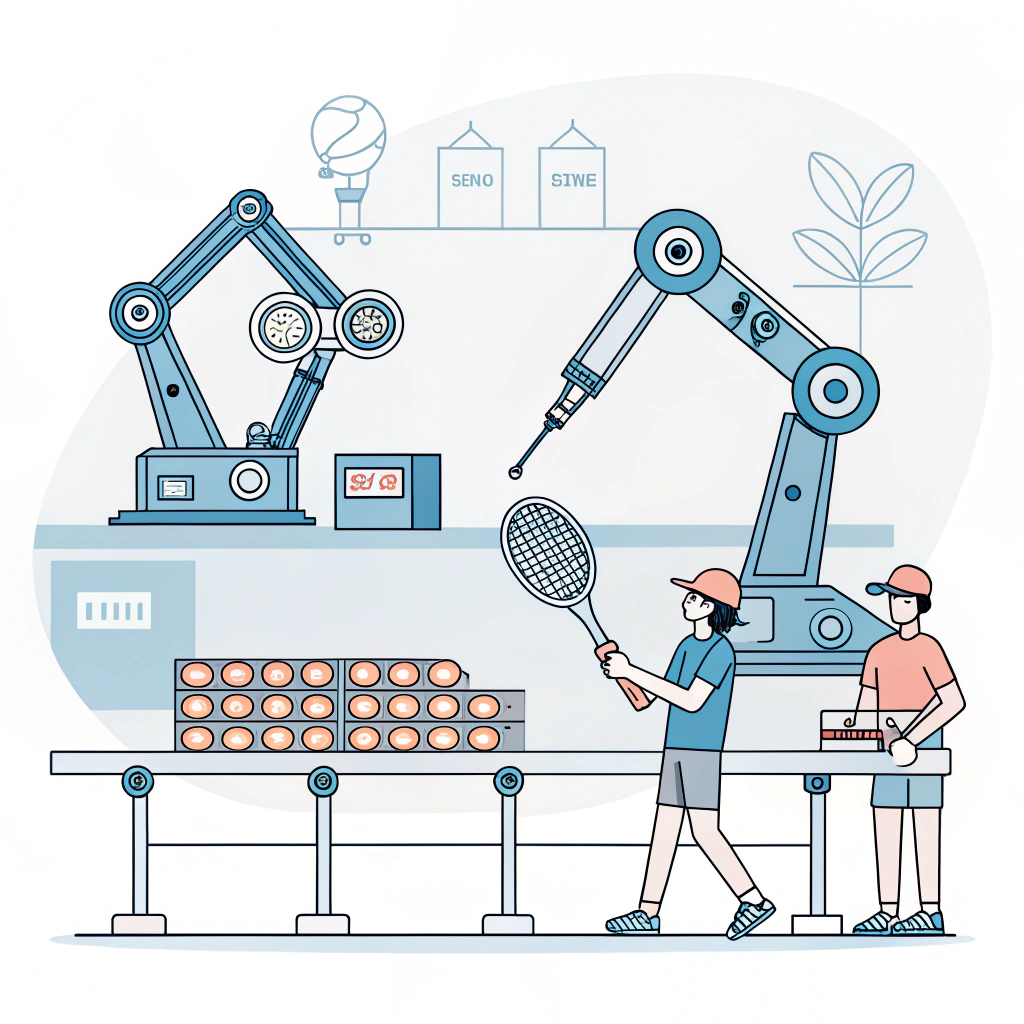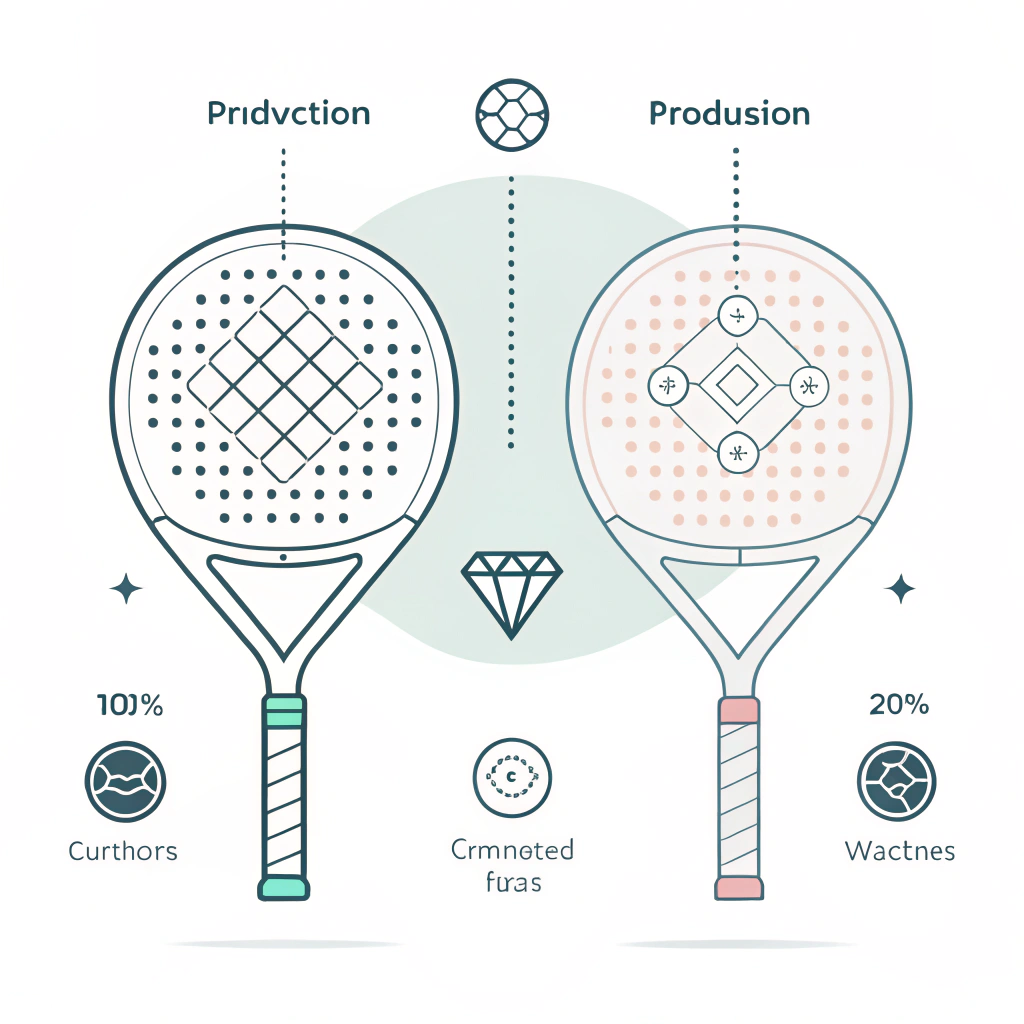Quick Answer: NEX Padel leverages advanced manufacturing techniques, rigorous quality control, and streamlined logistics to ensure that custom padel rackets are produced on time while meeting high-performance standards for international B2B procurement.
Procurement managers and supply chain specialists in the sports equipment industry often face significant challenges when sourcing specialized products from China. In the dynamic world of padel equipment, making timely deliveries while maintaining superior product quality is a constant balancing act. Many distributors struggle with delays caused by lengthy manufacturing lead times, complications in logistics, and the complexities of customizing equipment to meet market demands. These challenges can result in missed opportunities and frustrated clients who rely on timely supply for their business operations.
Especially in international trade, the efficiency of supply chain processes1—covering everything from production to final shipment—can determine a company’s competitiveness. The need for precise coordination between high-quality production and expedited shipping is more critical than ever when customers are not only demanding enhanced performance from their padel rackets but also quicker turnaround times.
Understanding the core reasons for these delays is essential:
-
Manufacturing Complexity:
The production of padel rackets, especially those that require advanced customization such as varying carbon fiber2 specifications (3k, 12k, and 18k), is inherently complex. Each design variant, whether it is the Diamond, Round, or Teardrop profile, has distinct production processes and quality requirements that can extend lead times. -
Customization Requirements:
Today’s B2B clients demand a high level of customization—ranging from tailor-made shapes to unique printing and color options, including custom logos on hand grips and handle covers. Meeting these bespoke requirements introduces additional steps in production, including design verification and quality assurance processes. -
Logistics and Shipping Constraints:
International logistics play a crucial role in the delivery timeline. Factors such as port congestion, customs clearance issues, and the use of expedited shipping3 methods can influence the overall delivery speed. Even if production is efficient, delays in shipping can have an equally disruptive effect on the supply chain. -
Quality Control and Compliance:
Ensuring that every racket meets stringent quality standards is non-negotiable. The adoption of advanced production techniques means that rigorous quality control measures are integral to the process, which can, in some cases, extend the production cycle if issues are identified.
To address these challenges, companies like NEX Padel have developed comprehensive solutions that streamline production and shipping while ensuring product excellence.
NEX Padel has invested in upgrading production lines to leverage the latest techniques:
- Automated Process Controls: Robotic assembly lines for precision placement of materials help minimize human error and maintain consistency across products.
- Material Spectrum: By offering a range of materials—from fiberglass to various grades of carbon fiber—NEX Padel adapts quickly to different requirements without compromising quality.
- Custom Design Integration: Advanced computer-aided design (CAD systems4) allow for rapid prototyping and validation of custom shapes and designs, reducing the overall design-to-production cycle time.
Quality control is embedded at every stage of production:
- Inspection Protocols: Every padel racket undergoes multiple rounds of inspection, starting from raw material verification to final product testing.
- Data-Driven Monitoring: Production data is continually monitored to detect any deviations early, ensuring that corrective actions are implemented promptly.
- Compliance Checks: Each product is tested against international standards to ensure that it meets both quality and safety guidelines.
Effective logistics strategies help overcome shipping delays:
- Strategic Partnerships: Collaborations with reliable shipping companies and freight forwarders ensure that the products transit smoothly, even under tight deadlines.
- Expedited Shipping Options: For urgent orders, options such as air freight or prioritized container shipments can significantly reduce transit times.
- Real-Time Tracking: Advanced tracking systems allow procurement managers to monitor the shipment status in real time, which helps in planning and mitigation of potential delays.
Customization is achieved without sacrificing efficiency:
- Dedicated Customization Teams: Specialized teams are trained to handle custom orders, ensuring design specifications are met without delay.
- Modular Production Lines: Production lines are designed to be flexible, allowing for quick adjustments when switching between standard and custom designs.
- Comprehensive Order Management: An integrated order management system helps track every custom request from initial design consultation to final delivery, ensuring transparency and accountability.
Below is a table that summarizes key factors influencing production lead times and how various customization options impact overall delivery, helping you make informed procurement decisions.
| Factor | Standard Production Time | Customization Impact | Mitigation Strategy |
|---|---|---|---|
| Material Selection | 3-5 days | Higher-grade carbon fibers may add 1-2 days | Pre-ordering materials and using automated controls |
| Custom Design Implementation | 1-2 days | Complex designs could add 2-3 days | Fast prototyping using CAD systems |
| Quality Control and Testing | 1-2 days | Rigorous QC for custom orders can add 1 day | Data-driven monitoring methods |
| Logistics and Shipping | 3-7 days (expedited shipping available) | Depends on destination; custom packaging may add 1 day | Strategic shipping partnerships, expedited freight |
This table highlights how production speed can be optimized while still meeting the sophisticated needs of B2B customers who demand both quality and timely delivery.
Consider a recent engagement with a leading sports equipment distributor that required a series of custom padel rackets. The client needed the following:
- A mix of both Round and Diamond shaped rackets, each tailored with specific carbon fiber compositions.
- Custom branding elements on the hand grips and handle covers.
- A strict delivery timeline due to the upcoming season launch.
-
Initial Consultation:
The client worked directly with NEX Padel’s customization team to detail the specifications. Precise requirements like the type of material (3k for standard play and 12k for performance enhancement) were outlined and confirmed. -
Rapid Prototyping and Design Approval:
Using our advanced CAD systems, prototypes were developed within 48 hours. The quick turnaround allowed for immediate client feedback and minor adjustments without affecting the overall timeline. -
Concurrent Production and Quality Assurance:
With a dedicated production line for custom orders running in parallel with standard orders, the entire batch was completed within a combined production cycle of 7 to 10 days. Parallel workflow management ensured both types of orders did not intermingle, which maintained high consistency and quality. -
Efficient Logistics Coordination:
Our logistics team coordinated with international freight forwarders to expedite shipping. Real-time shipment tracking kept the client informed every step of the way, ensuring a seamless delivery process.
This case clearly illustrates the benefits of integrated production planning, quality control, and logistics management. For a procurement manager, these aspects are critical to ensuring that orders are fulfilled accurately and on time, avoiding the common pitfalls of delayed or subpar products.
- Forecasting Tools: Implement robust forecasting systems to predict demand fluctuations. This provides clarity on production volumes and avoids bottlenecks.
- Inventory Management: Maintain strategic inventory levels of key materials to prevent delays due to supply shortages.
- Supply Chain Visibility: Ensure comprehensive visibility from production to final shipment. A transparent system helps in identifying and addressing delays at an early stage.
- Client Updates: Regular updates through email or an integrated tracking system keep customers informed about production progress and potential delays.
- Feedback Loops: Collect and analyze customer feedback continuously to fine-tune production and shipping processes.
- Flexibility in Production: Being able to quickly switch between different production lines enables companies to balance standard and custom order demands efficiently.
- Legal and Regulatory Compliance: Adhering to international quality and safety regulations is crucial. This reduces the risk of shipments being held or rejected at borders.
- Contingency Planning: Develop contingency plans for logistics disruptions, including alternative shipping routes and methods.
In the competitive realm of padel equipment procurement, ensuring timely delivery and effective customization are paramount to winning and retaining business. By employing advanced manufacturing techniques, rigorous quality control protocols, and optimized logistics solutions, NEX Padel stands at the forefront of resolving common supply chain complexities.
For procurement and supply chain professionals, the journey to seamless international trade is about understanding every aspect—from production intricacies to the nuances of shipping logistics. NEX Padel’s proven methodologies not only ensure high-quality products but also guarantee on-time delivery, making us a trusted partner in the sports equipment industry.
If you’re looking to enhance your product sourcing and optimize delivery timelines, consider partnering with a manufacturer that values precision, customization, and efficiency. Get in touch with us to discuss how NEX Padel can support your next project with reliable, high-performance padel rackets that meet your exact specifications.
Q1: What factors affect the production lead time of custom padel rackets?
A1: Production lead time is influenced by manufacturing complexity, material selection, intricate customization requirements, and rigorous quality control processes. These factors, managed effectively through advanced automation and dedicated customization teams, can optimize the overall cycle.
Q2: How does NEX Padel ensure on-time delivery for international shipments?
A2: NEX Padel uses strategic partnerships with reliable shipping companies, offers expedited freight options, and employs real-time shipment tracking. This streamlined logistics management helps overcome common shipping delays in international trade.
Q3: What customization options are available for padel rackets manufactured in China?
A3: Customization options include different racket shapes (Diamond, Round, Teardrop), various carbon fiber grades, personalized printing and color schemes, as well as custom logos on hand grips and handle covers. Advanced design software and modular production lines ensure that these customizations meet strict quality standards while remaining efficient.
-
Supply chain processes: Click here to delve into the complexities of managing end-to-end supply chain processes—from production planning to final shipment—and learn how integrated systems can boost competitiveness in B2B markets. ↩
-
Carbon Fiber: Click here to learn about the different grades and properties of carbon fiber, its applications in sports equipment manufacturing, and how variations like 3k, 12k, and 18k affect performance and production. ↩
-
Expedited shipping: Click here to understand the strategies behind expedited shipping, including air freight options and prioritized container shipments, and how they help reduce delivery times in international trade. ↩
-
CAD systems: Click here to explore how computer-aided design systems streamline product prototyping, reduce design-to-production cycles, and enhance customization capabilities in manufacturing. ↩







